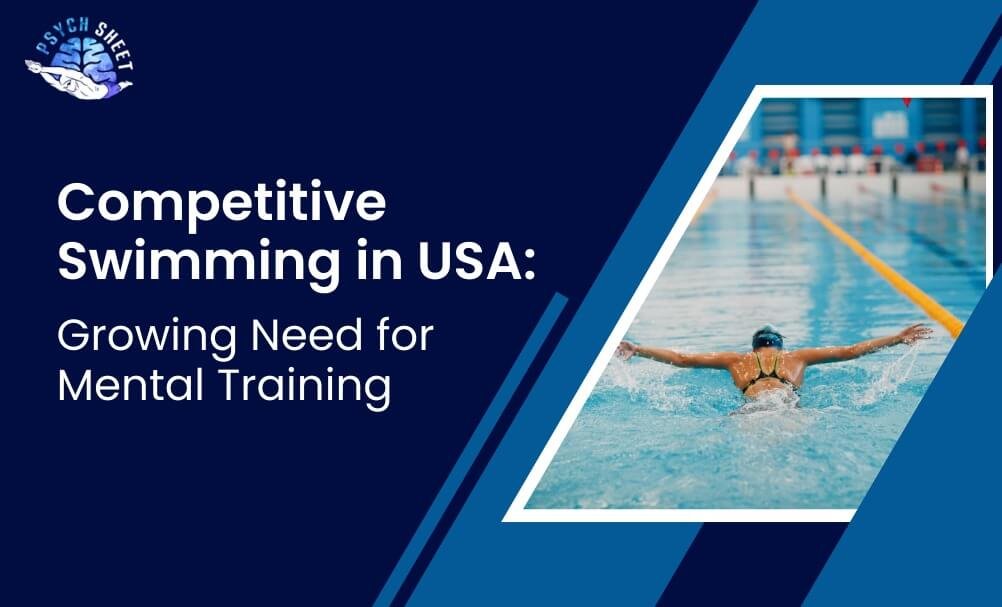The State of Competitive Swimming in the USA: Growing Need for Mental Training for Swimmers and Parents

Competitive swimming has been a sports powerhouse in the United States, sending stars like Michael Phelps, Katie Ledecky, and Caleb Dressel to the world stage. In addition, the sport continued to grow along with swim clubs, collegiate programs, and levels of competitions that rival the Olympic Games. But when the demands on swimmers rose, so did the recognition that mental preparation forms as integral part of competitive success. It reflects an ever-broadening perception that mental health is linked with performance, not only for the athlete but for the parent.
The Current Landscape of Competitive Swimming
Another sport that is extremely popular in the U.S. is swimming-which not only has over 400,000 registered swimmers nationwide through USA Swimming but is also the national governing body for this sport. Young athletes begin participating in local clubs, follow through with regional and national competitions, and many continue their careers as collegiate swimmers trying for a position on the U.S. National Team and eventually the Olympics.
The United States swimming system is intended to operate on all tiers, giving the swimmer multiple opportunities to develop individual skill and to compete at the highest levels. Traditionally, entrance into the swimming system occurs in clubs whose best performers are tapped for participation in increasingly competitive swimming competitions up through state, regional, and national championships. For a few exceptional athletes, competition for a berth on the U.S. Olympic team constitutes the apex of success.
However, in the midst of all these facilities for developing a sport, there has been growing realization toward mental training; because with all these aids, it has become not only competitive but also pressure-packed, and therefore requires the factor of mental strength to withstand it all.
The Need for Mental Training in Competitive Swimming
After all, the difference between winning or losing in competitive swimming usually makes up but a fraction of a second. Certainly, conditioning and technique prevail, but in circumstances involving Olympic trials or international competitions, it is mental toughness that determines everything.
Swimmers face the pressures of coaches, teammates, parents, and, most importantly, themselves. Highly scheduled training is usually established very early in life, leaving them burned out, anxious, and mentally drained. Added pressure with the demands of academics and social life pushes them to new heights of performance.
Mental training increases interest among competitive swimmers because it covers enhancing skills such as confidence, concentration, resilience, and stress management. The research has been proven that these skills are what dictate the difference between which athlete sinks under the pressure or one who can come out on top when times get tight.
Techniques include visualization, goal setting, and mindfulness, for example visualizing racing in perfect detail from every stroke, turn, and finish. This helps prepare a swimmer’s mental condition for the race because he has confidence in his mind that he could actually do so. Goal setting will keep them focused on long-term objectives by breaking down the pathway to success step-by-step into manageable pieces.
Another important aspect of mental preparation is ability to manage nerves and anxiety before competition. Many competitive swimmers encounter performance anxiety more frequently than other athletes; it is very well understood how such anxiety arises in an athlete as he or she competes at the highest level, such as in national championships or Olympic trials. Through mental training, the swimmer is provided with skills and ways of mastering his jitters before the races in a way that he would be ready to have little pieces of speed when it would count the most.
Why Parents Need Mental Training Too?
Even though mental preparation is critical, as well, for swimmers, though, the same holds true for that of their parents. The stresses of raising competitive swimmers do have their own unique conditions, and emotional condition of such parents can directly make its way into affecting a child’s performance. Their bond with their child becomes that most important determining factor in building a young swimmer, and learning to give the right kind of support is critical.
Competitive swimming is an investment of money, emotional investment, and so much time for the parent. There will be early-morning practices, weekends spent attending swim meets, and stress to fit in your child’s training schedule around school, not to mention family time. Without realizing it, parents are placing all of their fears, anxieties or expectations on their swimmer, thereby ratcheting up the pressure on him or her.
There’s psychological training for parents-schools on how not to be a source of excess stress in support. Balance to nudge toward performances, yet let them have fun enjoying swimming. Tools for parents to navigate the rollercoaster of competitive swimming. When the child doesn’t get it done: disappointment, frustration, and helplessness. One can see how this mental training will bestow an ability in a parent to control his or her thoughts without letting it affect the child’s performance.
More importantly, parents should learn effective communication with their children about swimming. Open communication would let parents develop a positive ambience by making the swimmer feel supported instead of being pressured. Mental training will equip parents with strategies in questioning correctly, listening actively, and giving constructive feedback without overwhelming their children.
The Role of Coaches in Mental Training
To prepare both the swimmers and, in fact, their parents, coaches are playing an important role. They are frequently the earliest support systems for young athletes, and they have a job to put first before mental preparation. The best coaches know that mental toughness is at least as important as any physical conditioning, and they will include mental training techniques as part of their practice.
This can be done by the coaches. That is, growing the thought of swimmers toward challenges as an opportunity for improvement rather than failure, contributing thereby to reinforcement of hard work and perseverance in swimmers in times of adversity.
Coaches can also be able to act as a bridge between swimmers and their parents in terms of the help that coaches offer in expectation management and positive communication. The coach may help parents channel their focus on the long-term development of their child rather than concentrating on the immediate results, thus helping to eliminate some of the pressure that the parents may unconsciously put on their swimmers.
Mental Health and Well-Being in Competitive Swimming
The mental well-being of swimmers has become more important than ever. High-profile athletes recently utilized their high profile to share that they can suffer from mental health issues: even elite athletes and among swimmers themselves. This conversation has opened the doors even further for discussion about mental health in sports and the resources needed so that all levels of athletes have support.
Burnout, anxiety, and depression: summits among swimmers. These are the peak outcomes of pressure to perform and general physical demands of such a sport that might lead to mental and emotional burnout. Mental health support with the presence of sports psychologists and mental health practitioners is gradually finding ground within the swimming fraternity but there is still much work to be done.
Indeed, such programs that combine mental health provision with physical training are fast becoming the norm; rightly so. Swimming, coaches, and parents must come to the realization that mental health is as important as physical health and, hence, receives equal concern and attention.
Conclusion
Such a strong state of competitive swimming in the U.S., it increasingly becomes apparent as competitive swimming grows tougher and the tasks for swimmer bodies and families ever more difficult that mental training is vital to long-term success.
No longer can mental training be considered an option; in fact, it’s something required. Swimmers must be fostered in an environment where mental health prevails. The parents also need to be involved in the process, and the coaches are going to have to play a key role as well in all of this.
The U.S. competitive swimming community can ensure that its athletes continue to shine at performance levels while remaining in love with the sport by focusing on mental training and well-being. It is not just the physical talent that determines the future of competitive swimming but also the mental robustness of the athletes and the systems working around them. If you look forward to more information about swimming and mental training, you can read and follow Psychsheet.
